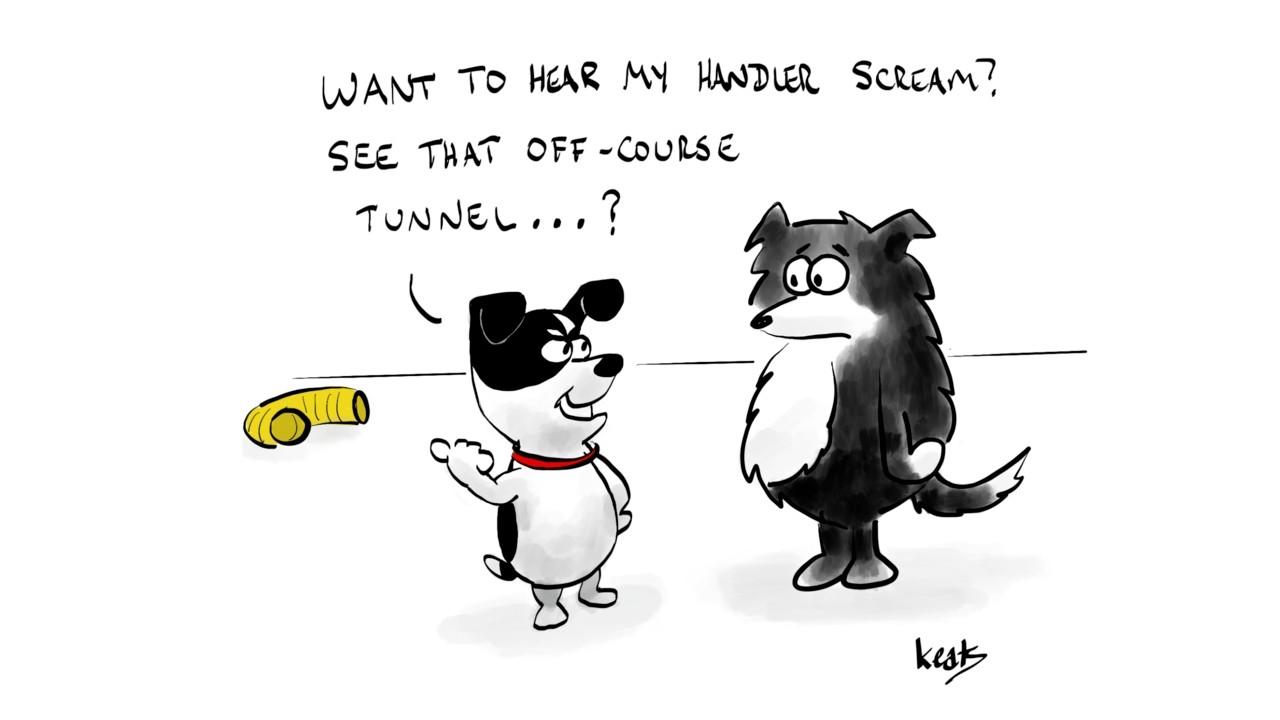5 Ways You Sabotage Your Walkthroughs (Plus The Ultimate Test Of Readiness)

[Make sure to get to the end of the post to get your free download!]
Round and round you go.
Trying to remember the course, decide on your handling...wait, the walkthrough's over? "I'm not ready!" you wail.
But top handlers seem to memorize courses in an instant, don't they?
They figure out the course flow, choose their strategy, and nail it down in just a few minutes.
How is that possible?
Here are five ways you sabotage yourself and tips to improve for faster strategizing and memorization — PLUS the one question that will test your readiness to run (and free download!).
Mistake #1: You start handling the instant you step on the course.
If you add handling the first time you walk a course before you walk the whole thing, your first thoughts on handling might not make sense for the overall flow.
The problem is this —> what you learn first, you learn best.
You may accidentally cement the wrong handling into your brain.
So figure out the flow before strategizing, even before setting foot in the ring if possible. (If you have course maps, only use them for general flow, as the course may look much different from the paper.) Learn the course flow first, then look for what the dog might see before trying out handling choices.
Mistake #2: You memorize one obstacle at a time.
In general, our short-term memory only holds 7 pieces of information at a time. 21 obstacles will overwhelm you, and make you feel like everything is moving too fast.
Learn to look for and recognize patterns (e.g. pinwheels, lines, serpentines) so you can group obstacles together in groups.
This allows you to run with more flow, like a good driver who looks ahead. Handling obstacle by obstacle is like a bad driver who is only looking a few feet out in front of the car.
Plus, instead of memorizing 21 obstacles, which is a lot to keep straight, you only need to remember 5 - 7 "chunks". And that's exactly what our brain is happy with.
Mistake #3: Your plan is course-oriented, instead of dog-oriented.
There are lots of technically correct ways to run a course.
But the key is to know how the course will affect YOUR dog.
Think about his (and your) strengths and weaknesses.
Are there challenges that will make him jump longer than usual, making the line of approach to the next obstacle more difficult? Are there discriminations that are harder or easier for him? Places where it will be harder for you to be there to help him?
Then handle to maximize your team's strengths.
You don't drive a highway, you drive a car and navigate a highway. You don't handle a course, you handle a dog and navigate a course. — Kathy Keats
Mistake #4: You're a member of the Walking Dead.
After the first two passes around the obstacles, your brain switches to autopilot — like when you drive to work and don't know how you got there.
But most people just repeat a course over and over, like it's the zombie apocalypse.
When your brain is on autopilot, you no longer see the nuances in the course. Because you aren't present, you might imagine yourself or your dog being places that just aren't possible.
Change up how you look at the course. Try back-chaining from the end, air-handling on the sideline, or running instead of walking.
Mistake #5: You take as long as you like to memorize courses at home.
Judges are often great at memorizing courses because they see so many. It's simply a matter of practice.
Memorizing is a skill like any other, so practice pushing yourself.
One way to is to try memorizing the course as fast as possible in training or off a YouTube video. Start with easier sequences and build up to longer and trickier ones.
Bonus: The ultimate test of your walkthrough
Here's the test — the big question.
Can you close your eyes and physically walk the course?
You know, like you're sleep walking.
Yep, it's a thing.
I call it the Walking Blind ( as opposed to Walking Dead 🤣) drill because most people kinda look like zombies the first time they try it. 😁
If you can do that, you know you've got the course internalized enough to give your dog the attention he deserves.
Watch top handlers, and you'll see they only need to glance at the course at crucial moments. That's because they can pretty much *feel* their way around and only need fractions of a second to orient.
Want to learn how to confidently walk a course with your eyes closed?
CLICK HERE FOR A FREE PDF DOWNLOAD OF THE WALKING BLIND DRILL
If you've done the work and trained well, then choosing a great strategy and preparing properly for a single run is the key to making all that hard work pay off.
I want to improve my mental game!
Please send me the FREE 10-Part "Power Up Your Mental Game" course!
You can unsubscribe at any time.

